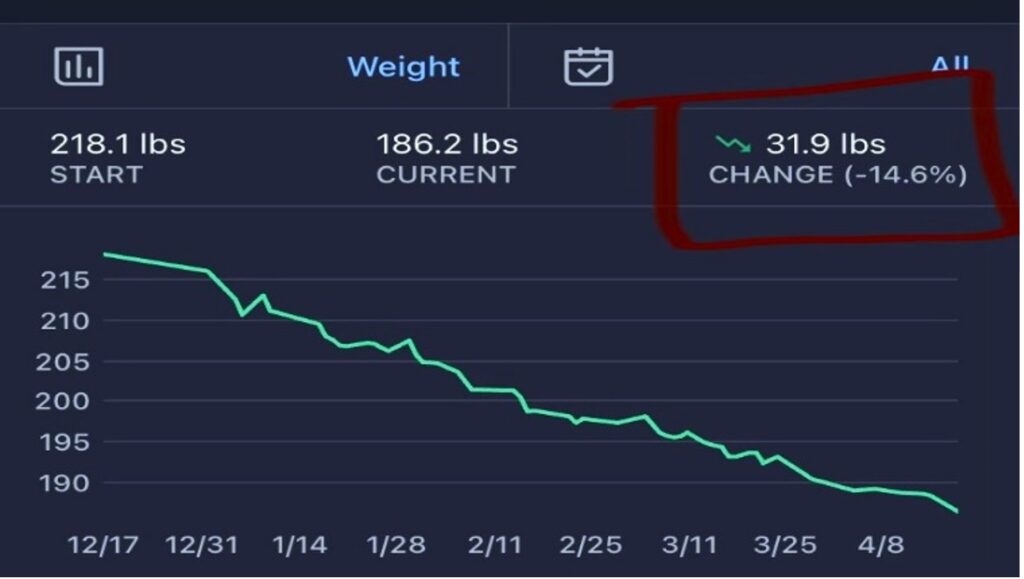Imagine a world where “dieting” is just for quitters, willpower is for amateurs, and enjoying fresh, balsamic vinegarette on your salad is not a crime. A world where you are free to eat foods that are totally nourishing to your body and your very soul. In a world where health and fitness are at the forefront of our priorities, the concept of DNA based weight loss is revolutionizing how we approach our whole-BEING journey. Weight management has long been a puzzle, with countless diets and exercise programs offering varied results. However, one crucial piece of the puzzle which has recently come to light is the role of genetics.
As the field of genetics evolves, it has become increasingly evident that genes contribute to more than just determining our hair and eye color. Genetic factors play a significant role in shaping your individual uniqueness. And this type of individuality requires personalized solutions when it comes to your fitness and nutrition recommendations.
Recent advances in genetic testing provide for the ability to design programs so accurate and predictable, that your success–when following the recommendations–is virtually assured. This is perhaps the most exciting development in the health and fitness arena. So… set that kale smoothie aside and read on!

Why DNA based Weight Loss Matters?
For years, weight loss has been considered a one-size-fits-all endeavor. However, recent advancements in genetics have unveiled the incredible potential of personalized weight loss plans. Your DNA holds unique insights into how your body responds to nutrition, exercise, and lifestyle choices.
Understanding your genetic profile empowers a professional certified in genetics-based program design to tailor a weight loss journey to your individual needs, making it more effective and sustainable.
Let’s explore the science behind DNA based weight loss, the tools available for genetic testing, and how you can use your genetic insights to optimize your diet, exercise routine, and overall whole-BEING.
The Role of Genes in Weight Management
Genetics plays a pivotal role in determining various aspects of our health, including our body weight and composition. Your genes influence how your body processes food, stores fat, and responds to physical activity.
Understanding this genetic foundation helps create an approach to weight management in a way that is uniquely suited to your biology.
DNA Based Weight Loss – Key Genetic Factors That Influence Your Weight
To unlock your genetic weight loss potential, it’s essential to understand the specific genetic factors that come into play. These factors will vary from person to person and include:
Genetic Predisposition to Obesity
Some individuals have genetic variations that make them more susceptible to obesity. These variations can affect how their bodies regulate hunger, metabolism, and fat storage.
Fat Metabolism Genes
Genes involved in fat metabolism can influence how efficiently your body burns or stores fat. Some people may have genetic variants that make it easier for them to shed pounds through specific dietary approaches.
Appetite Regulation Genes
Genes that regulate appetite and hunger hormones can influence eating habits. Understanding these genes can help you make informed choices about portion control and meal timing.
Insulin Sensitivity Genes
Insulin is a hormone that regulates blood sugar levels and fat storage. Genetic variations can affect how your body responds to insulin, impacting your risk of weight gain.
Genetic Factors in Emotional Eating
Certain genetic variants may be associated with emotional eating patterns. Identifying these factors can help with the development of strategies to address emotional triggers for overeating.
Genetic Response to Exercise
Your genes can influence how your body responds to different types of exercise. Some people may be genetically predisposed to excel in strength training, while others may thrive in cardiovascular, or High Intensity Interval Training (HIIT) activities.
Nutrient Processing Genes
Genetic variations can affect how your body processes nutrients such as carbohydrates, fats, and proteins. Understanding these genes can guide your dietary choices.
By gaining insights into one’s unique genetic makeup and how it relates to these key factors, you can begin to see why a one-size-fits-all approach to weight management often falls short. Instead, a personalized approach that considers your genetic profile can lead to more effective and sustainable results.
An estimated 60-70% of obese Americans attempt to lose weight each year, with only a small minority able to achieve and maintain long-term weight loss (1).
Weight loss programs created according to an individual’s DNA have proven to be much more effective than cookie-cutter, generic programs. A recent study published by the European Society of Human Genetics found that dieters employing weight management programs tailored to the individual’s genome lost up to 33% more weight than those following standard, “one size fits all” weight loss programs (2).
The Science Behind DNA Testing
DNA testing, also known as genetic testing or genotyping, is a process that examines an individual’s DNA to identify specific genetic variations or markers. These markers provide valuable information about various aspects of your health, including how your body responds to food, exercise, and other lifestyle factors.
Let us understand DNA based weight loss and the science behind DNA testing which involves:
Sample Collection
DNA samples are collected through simple methods like saliva or cheek swabs. These samples contain genetic material that can be analyzed to extract information about your genetic makeup.
Genotyping
After sample collection, advanced laboratory techniques are used to analyze one’s DNA. This process involves identifying specific genetic variations, known as single nucleotide polymorphisms (SNPs), that are associated with various traits and characteristics (3).
Data Interpretation
Once the DNA is analyzed, the resulting data is interpreted to provide insights into how genetics may influence an individual’s weight management journey.
The Power of Personalized Nutrition in DNA Based Weight Loss
Personalized nutrition takes the “one-size-fits-all” approach to dieting and turns it on its head and plays a crucial role in DNA based weight loss. Instead of following generic dietary recommendations and exhaustive restrictions, personalized nutrition considers individual genetic factors, making an eating plan uniquely suited to what your body needs.
The benefits of personalized nutrition include:
Efficiency
By aligning a diet with one’s genetics, an individual can achieve better results with less effort and potentially avoid frustrating plateaus.
Sustainability
Personalized nutrition is more likely to lead to long-term dietary changes because it’s tailored to one’s preferences and how the body responds to food.
Precision
A client gains insights into macronutrient needs, allowing one to optimize intake of carbohydrates, fats, and proteins.
How Genes Influence Dietary Choices
Your genes play a significant role in determining how the body processes and reacts to different types of food. Here are examples of how genetics can influence your dietary choices:
Taste Preferences
Genetic variations can affect your sensitivity to certain tastes. Some people may be more inclined to enjoy sweet or savory flavors, which can influence their food choices.
Metabolism of Macronutrients
Genes impact how efficiently one’s body metabolizes carbohydrates, fats, and proteins. This will influence macronutrient requirements and how the body stores excess energy.
Nutrient Absorption
Genetic factors can affect how well your body absorbs and utilizes essential nutrients like vitamins and minerals.
Food Sensitivities
Genetic variations can make an individual more susceptible or less susceptible to food sensitivities or intolerances, such as lactose intolerance, gluten sensitivity, and rate of caffeine metabolism.
Discovering Genetic Preferences for Macronutrients
One of the most valuable insights from personalized nutrition is understanding one’s genetic preferences for macronutrients.
Macronutrients are the building blocks of one’s diet, consisting of carbohydrates, fats, and proteins. The genetic profile will provide guidance on the ideal macronutrient balance for the individual.
Here’s a brief overview of how genes can influence one’s macronutrient preferences:
Carbohydrate Sensitivity
Genetic variations can impact how one’s body processes carbohydrates. Some people may thrive on a higher-carb diet, while others may benefit from a lower-carb approach.
For example, testing of the IRS1 gene can clue you into how your body will respond to carbohydrate intake for achieving optimal body weight. (4)
Fat Metabolism
One’s genes can influence how efficiently they metabolize dietary fats. This insight can guide one’s choices between healthy fats and moderate-fat diets.
Protein Requirements
Genetic factors can determine one’s protein needs, helping the individual understand whether they should prioritize lean protein sources or plant-based proteins.

The Influence of Genetics on Exercise
Genes play a vital role in determining how one’s body responds to physical activity, the types of exercise one excels in, and one’s susceptibility to certain exercise-related conditions.
Here are some key aspects of genetic influence on exercise:
Muscle Fiber Type
Genetic factors determine the distribution of muscle fiber types in your body. This influences your natural athletic abilities and performance in activities such as sprinting, endurance sports, and strength training.
Exercise Recovery
Genes can impact how quickly your body recovers after exercise, including muscle repair and inflammation control. Understanding this can help you plan your workout frequency and intensity.
Injury Risk
Some genetic variations can increase your risk of exercise-related injuries, such as tendon injuries or stress fractures. Identifying these risk factors is essential for injury prevention.
Discovering Your Genetic Exercise Preferences
Your genetic profile provides valuable insights into the types of exercise that are best suited to your body. Key considerations for discovering your genetic exercise preferences include:
Strength vs. Endurance
Some individuals have a genetic predisposition for strength and power activities, while others excel in endurance-based exercises. Understanding your genetic tendencies will help you choose the right exercise modalities.
Cardiovascular Fitness
Genetic factors influence your cardiovascular fitness levels. Knowing your genetic profile guides your cardio workout intensity and duration.
Recovery Needs
Genetic insights reveal how your body responds to exercise-induced stress and inflammation. This information can help you plan rest days and recovery strategies.
Minimizing Exercise Injury Risks
Preventing exercise-related injuries is crucial for a safe and effective workout routine. Your genes can provide insights into potential vulnerabilities. Here are some steps you can take to minimize injury risks based on your genetic profile:
Balanced Training
Adapt your exercise routine to include a mix of strength, endurance, and flexibility training to reduce the risk of overuse injuries.
Proper Form
Focus on proper exercise form and technique to minimize the strain on vulnerable areas.
Individualized Warm-Up and Cool-Down
Tailor your warm-up and cool-down routines to address specific areas of vulnerability or injury risk.
Rest and Recovery
Pay attention to your body’s recovery needs, and don’t overexert yourself. Rest days are essential for preventing injuries.
Success Stories
Here are three inspiring, real-life stories from individuals who have achieved remarkable weight loss success through Iron Crucible Health Coaching’s 14-week, Whole-BEING Empowerment! Your DNA’s Blueprint for Lasting programs using DNA-based weight loss approaches. These stories showcase the power of personalized genetic insights.
Success Story 1: Client’s DNA Driven Weight Loss Transformation
Client ‘X’ struggled with weight management for years, trying various diets and exercise routines with limited success. Frustrated, she decided to explore DNA based weight loss. After undergoing simple genetic testing and receiving personalized recommendations, she adjusted her nutrition and exercise plans to align with her genetic profile.
Within a few months, Client ‘X’ noticed significant changes. She was losing weight consistently and had more energy than ever before. Her genetic insights helped her understand her ideal macronutrient balance and exercise preferences, making her weight loss journey more enjoyable and effective.
Client’s advice: “Don’t underestimate the power of your genes. Embrace your unique genetic makeup and use it as a roadmap to your healthiest self. The coaches at Iron Crucible Health are phenomenal and walked with me every step of the way!
Success Story 2: Client’s Genetic Fitness Revolution
Client ‘Y’, a fitness enthusiast, always wondered why some workout routines seemed more effective for him than others. When he explored genetic fitness and DNA based weight loss testing, he discovered that his genetic profile favored strength training over cardio.
Armed with this knowledge, Client ‘Y’ adjusted his exercise routine to focus more on strength training while incorporating personalized workout plans.
As a result, he gained lean muscle mass, improved his metabolism, transformed his physique, and achieved a weight loss of 32 pounds during Iron Crucible Health Coaching’s 14-week, Whole-BEING Empowerment! Your DNA’s Blueprint for Lasting Weight Loss Program.
Six months following completion of the program, he continued to gain strength, endurance, and fitness—in addition to having lost 40 pounds.
Client’s advice: “Your genes hold the keys to your fitness potential. Embrace your genetic strengths and tailor your workouts accordingly. I’ll never do another ‘diet’ ever again.“

Success Story 3: Client’s Emotional Eating Breakthrough
Client ‘Z’ had struggled with emotional eating for years, often turning to food to cope with stress, anxiety, and when feeling angry. Genetic testing revealed insights into her predisposition for emotional eating and stress sensitivity. Armed with this knowledge, she sought the guidance of a DNA-certified health coach at Iron Crucible Health Coaching, who specialized in behavioral change.
Through her 14-week program, she learned healthier ways to manage stress and emotions, and created personalized strategies. She also adjusted her diet to include foods that supported her mood and cravings. Over time, she successfully overcame emotional eating and achieved significant weight loss.
Client’s advice: “Understanding your emotional triggers and genetic tendencies is the first step to breaking free from emotional eating patterns.“
Conclusion
Personalized genetic insights are a game-changer in the world of weight loss and wellness. By harnessing the power of one’s individual DNA and tailoring the approach, weight loss and optimal whole-BEING is more within reach than ever before.
The study of human genetic material (Genomics) is constantly evolving and advancing, including the regular development of new technologies and data-analysis methods (5). Advances in technology, research, and healthcare delivery via health coaches, will ensure that personalized genetic insights are available to a broader population, leading to more successful and sustainable weight loss journeys, overall whole-BEING, and ultimately healthier people.
In conclusion, DNA based weight loss holds tremendous potential. With ongoing advancements in genetic research, technology, and personalized medicine, individuals have unprecedented opportunities to harness the power of their DNA for healthier, more personalized wellbeing and weight management.
Sources
- https://pubmed.ncbi.nlm.nih.gov/30610881/
- https://geneticdirection.com/how-it-works/#genetictesting
- https://geneticdirection.com/2019/05/14/7521/
- https://www.issaonline.com/blog/post/protein-carbs-and-fat-how-dna-affects-macros-in-your-diet
- https://www.genome.gov/about-genomics/educational-resources/fact-sheets/human-genomic-variation
Disclosure – This is a guest post, and the views expressed are of guest author and not of Healthieyoo’s editorial team. We disclaim any and all liability to any party, person, company, or product for any direct, indirect, implied, punitive, special, incidental, or consequential damages arising either directly or indirectly due to the use of content published in this article. The publishers of this website take no responsibility for any health issues, personal injury, death, disability, or any other harm due to the content on our website or any advice or opinion expressed on our website. Please consult your healthcare professional before consuming any supplement or using any product/ service/ treatment/advice. Please also read our medical disclaimer.

Holli Bradish-Lane, MBA, ACE-CHC, CPT, RRT, is the Founder and Chief Whole-BEING Officer at Iron Crucible Health Coaching. As a personal trainer and health coach certified in International Sports Sciences Association (ISSA) Genetics-Based Program Design, Holli offers genetics testing, interpretation, and individualized program development and coaching to clients seeking optimal weight management, longevity, or maximum sports fitness potential through DNA-Based, whole-BEING. Visit www.IronCrucibleHealth.com for more information.











